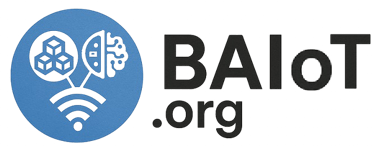Case Study Proposal: Autonomous Income Networks for Informal Workers
BAIoT.org proposes Autonomous Income Networks using Blockchain, AI, and IoT to empower informal workers by recognizing micro-contributions, automating fair payments, and enabling access to financial services—creating a decentralized, inclusive system to fight poverty sustainably.
10/4/20254 min read


Case Study Proposal: Autonomous Income Networks for Informal Workers
Fighting Poverty Through Blockchain, AI, and IoT
Presented by BAIoT.org
Executive Summary
Poverty persists not because people lack talent or drive, but because systems fail to recognize, reward, and protect informal labor. From street vendors and waste pickers to gig workers and subsistence farmers, billions of people contribute daily to their local economies — yet remain invisible to formal financial systems, social protections, and digital marketplaces.
This case study proposal introduces a bold initiative by BAIoT.org to pilot Autonomous Income Networks (AINs) for informal workers. By integrating Blockchain, Artificial Intelligence (AI), and the Internet of Things (IoT), AINs create decentralized, transparent, and intelligent ecosystems that recognize micro-contributions, automate fair compensation, and unlock access to financial services — without requiring formal employment or documentation.
1. The Challenge: Poverty in the Informal Economy
Over 60% of the global workforce operates in the informal sector. These workers face systemic barriers:
No formal contracts: Making income unpredictable and unprotected.
No access to credit or insurance: Due to lack of documentation or credit history.
No visibility: Their contributions are not tracked, valued, or rewarded.
No safety nets: They are excluded from pensions, healthcare, and unemployment benefits.
No digital identity: Preventing participation in online platforms or e-commerce.
Despite their economic importance, informal workers remain disconnected from the digital economy and vulnerable to exploitation, shocks, and poverty traps.
2. The BAIoT.org Solution: Autonomous Income Networks (AINs)
BAIoT.org proposes a pilot project in partnership with a city municipality and local cooperatives to deploy Autonomous Income Networks in urban informal sectors — starting with waste pickers, street vendors, and delivery gig workers.
AINs use Blockchain, AI, and IoT to create a decentralized infrastructure that:
Recognizes micro-contributions in real time.
Automates fair compensation through smart contracts.
Builds digital identity and reputation for informal workers.
Unlocks access to financial services like savings, loans, and insurance.
2.1 IoT for Contribution Tracking
Smart bins and scales track waste collection by informal recyclers.
QR-coded stalls log vendor activity and foot traffic.
GPS-enabled devices monitor delivery routes and service completion.
Edge sensors ensure privacy and local data processing.
IoT devices capture real-time data on informal labor — turning invisible work into measurable value.
2.2 AI for Value Attribution and Risk Scoring
Contribution scoring algorithms assess effort, impact, and consistency.
Reputation models build trust profiles based on verified activity.
Risk analytics enable micro-insurance and credit scoring.
Personalized recommendations guide workers to higher-value opportunities.
AI transforms raw data into actionable insights and equitable compensation.
2.3 Blockchain for Payments and Identity
Smart contracts automate payments based on verified contributions.
Digital wallets store earnings, savings, and benefits.
Decentralized identifiers (DIDs) provide portable, self-sovereign identity.
Tokenized incentives reward sustainable practices and community engagement.
Blockchain ensures transparency, security, and autonomy — without requiring banks or intermediaries.
3. Expected Outcomes
This pilot aims to demonstrate how Autonomous Income Networks can reduce poverty by empowering informal workers with recognition, income, and access.
3.1 Economic Empowerment
Increased and stabilized income through automated micro-payments.
Access to savings, loans, and insurance via digital wallets.
Reduced dependency on exploitative middlemen.
3.2 Social Inclusion
Recognition of informal labor as valuable and dignified.
Digital identity and reputation for previously undocumented workers.
Inclusion in city planning, benefits, and digital platforms.
3.3 Systemic Innovation
Shift from centralized welfare to decentralized income ecosystems.
Real-time labor data for policy, planning, and impact measurement.
Scalable model for cities, cooperatives, and humanitarian programs.
4. Strategic Alignment with BAIoT.org’s Mission
This initiative reflects BAIoT.org’s commitment to ethical, inclusive, and impactful technology convergence:
Ethical: Workers control their data, earnings, and identity.
Inclusive: Designed for low-literacy users and mobile-first environments.
Impactful: Directly addresses poverty through income generation and financial access.
Collaborative: Built with cooperatives, municipalities, and civil society.
5. Implementation Roadmap
Phase 1: Community Engagement and Co-Design
Partner with local cooperatives and informal worker associations.
Conduct participatory workshops to define needs, risks, and goals.
Map existing workflows, pain points, and informal networks.
Phase 2: Infrastructure Deployment
Install IoT devices in pilot zones (e.g., markets, recycling hubs).
Develop AI models for contribution scoring and risk analytics.
Set up blockchain infrastructure and digital wallets.
Phase 3: Enrollment and Training
Enroll workers using biometric and mobile verification.
Issue digital IDs and onboard wallets.
Train users on device use, data rights, and financial literacy.
Phase 4: Activation and Monitoring
Launch smart contracts for automated payments.
Monitor contributions, earnings, and service access.
Collect feedback and iterate on system design.
Phase 5: Evaluation and Scaling
Measure impact using KPIs (e.g., income stability, service access, user satisfaction).
Publish open-source tools and findings.
Expand to additional sectors and cities.
6. Risk Management and Mitigation
Technical Risks
Device failure or data loss: Mitigated through redundancy and edge processing.
AI bias: Addressed through diverse training data and community oversight.
Social Risks
Resistance to technology: Managed through peer-led training and trust-building.
Data misuse concerns: Mitigated through encryption, consent protocols, and transparent governance.
Operational Risks
Low adoption: Boosted through incentives and cooperative engagement.
Funding gaps: Addressed through blended finance and impact investment.
7. Broader Impact and Replicability
This pilot is designed to be replicable across informal sectors and geographies. By using open-source tools, modular architecture, and community governance, Autonomous Income Networks can be adapted for:
Rural subsistence farmers tracking crop contributions.
Informal transport workers logging routes and passengers.
Domestic workers verifying hours and service quality.
It also supports multiple Sustainable Development Goals (SDGs), including:
SDG 1: No Poverty
SDG 8: Decent Work and Economic Growth
SDG 10: Reduced Inequalities
8. Call to Action
Poverty is not inevitable — it’s a failure of systems to recognize and reward human effort. Autonomous Income Networks offer a new paradigm: one where informal labor is visible, valued, and fairly compensated.
BAIoT.org invites cities, cooperatives, technologists, and funders to join us in building decentralized income ecosystems that fight poverty with dignity, data, and innovation.
Ways to Get Involved
Partner with us to pilot AINs in your city or sector.
Contribute to open-source development of scoring models and smart contracts.
Sponsor training and device deployment for informal workers.
Join our global coalition for ethical tech and inclusive economies.
Visit BAIoT.org to learn more, access resources, and become part of this transformative movement.
Conclusion
This case study proposal presents a disruptive vision: a world where poverty is not fought with charity, but with technology that recognizes and rewards every contribution. By combining Blockchain, AI, and IoT, we can build Autonomous Income Networks that empower informal workers to earn, save, and thrive — on their own terms.
BAIoT.org is ready to lead this change. Are you ready to join us?
Advocate
Pioneering the convergence of blockchain, AI, and IoT.
Connect
Support
Copyright © 2025 BAIoT.org. All rights reserved.
